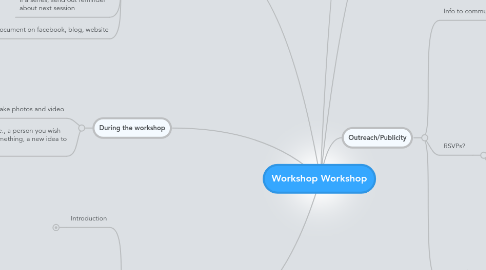
1. Workshop Flow
1.1. Introduction
1.1.1. Who you are
1.1.2. Sign-in sheet for participants
1.1.3. If small group, introductions around the room (if larger group ask people to introduce themselves before they speak for the first time)
1.1.4. Overview of "What you will learn today"
1.1.4.1. Bullet points (verbal or visual) of "what we will cover" so participants know where they're at in the overall process.
1.2. Cycle to repeat for small blocks of knowledge (i.e., for each of your prepared bullet points)
1.2.1. Intro to segment
1.2.2. Distribute handout, if any
1.2.3. Talk, and demo of skills (if any)
1.2.4. Q&A
1.2.5. Discussion & Activity
1.2.6. Recap
1.3. Winding Up
1.3.1. Repeat of introductory overview, "what you have learned"
1.3.2. Provide list of follow-up/additional resources
1.3.3. Distribute & collect evaluation forms (Depending on age of audience)
2. MY PRESO OF ALL THIS
2.1. DISTRIBUTE print outline from this map (except for this topic)
2.2. Sign-up sheet for an email with further resources
2.3. TALK
2.3.1. types of workshops
2.3.1.1. gardening
2.3.1.2. composting
2.3.1.3. cultural
2.3.1.3.1. i.e., decorations for an ethnic holiday
2.3.1.3.2. cooking
2.3.1.3.3. costume-making
2.3.1.3.4. art
2.3.2. Follow outline up to "YOUR NOTES" to demo how a dense handout can kill attention & interaction, and switch to index cards.
2.4. Activity: hand out fill-in sheet for high level of "planning and preparation"
3. After the workshop
3.1. For yourself: Review, Reflection, Notes for next time. What worked? What didn't? How might you improve the workshop for next time?
3.2. email participants if applicable
3.2.1. thanks
3.2.2. links to resources
3.2.3. invite them to sign up for your newsletter, and/or invite into your online community if you have one
3.3. if a series, send out reminder about next session
3.4. document on facebook, blog, website
4. During the workshop
4.1. take photos and video
4.2. make notes if necessary (i.e., a person you wish to follow up with about something, a new idea to incorporate next time, etc)
5. Planning and Preparation
5.1. Workshop Info
5.1.1. Workshop Name
5.1.2. One-time or series?
5.1.2.1. If series, what is the distinct nature of each session?
5.1.3. Knowledge & Skills
5.1.3.1. What Knowledge will participants gain?
5.1.3.2. What Skills will participants practice?
5.1.3.3. Make a bullet list for breaking the workshop up into sections
5.1.4. Who is it for?
5.1.4.1. What age group?
5.1.4.2. What prior knowledge or skills might be necessary
5.1.4.3. What languages might people speak?
5.1.5. How long will the session be?
5.2. Venue (your location or a host location)
5.2.1. What resources are there? (whiteboard, chairs & table, coffee maker....)
5.2.2. What is the capacity? (size of room, number of chairs, number of people you can effectively facilitate at one time)
5.3. What materials should you prepare?
5.3.1. YOUR NOTES - bare bones, on index cards works well.
5.3.2. Documents, Visuals & Further Resources
5.3.2.1. Sign-in sheet(s)
5.3.2.2. List of handouts
5.3.2.2.1. At least a handout of further resources
5.3.2.3. Other visual aids
5.3.2.3.1. Photos? Slideshow? Video? Charts?
5.3.2.4. List of online/further resources
5.3.2.5. Evaluation forms
5.3.2.6. What online resources (if any) should be ready for participants to view?
5.3.3. Materials & Supplies
5.3.3.1. Materials and equipment for a demo (if any)
5.3.3.2. Easel? Markers? Big paper?
5.3.3.3. Materials, tools, equipment for participants to use
5.3.3.4. Protective gear? (gloves? aprons? rain protection? etc)
5.3.3.5. Clean-up materials? (water? wipes? etc)
5.4. Day-Of Considerations
5.4.1. Personnel: Do you need helpers? How many presenters/facilitators? Will you divide up portions of the workshop among different facilitators? Or just have assistants around the room (such as to help with activities, or help host in general)
5.4.2. What do participants need to bring? (if anything)
5.5. REHEARSE
5.5.1. what notes do you need in front of you? (don't overdo it)
5.5.2. Is there enough/too much to cover and do within the timeframe of the workshop?
6. Outreach/Publicity
6.1. Info to communicate
6.1.1. Name of workshop
6.1.2. Place, date & time, map and/or directions
6.1.3. bullet list of what will be covered
6.1.4. Is it part of a series? If so, info about series.
6.1.5. who it is for (i.e., prior knowledge, residency/neighborhood requirement, age group)
6.1.6. se habla español?
6.1.7. Do people need to rsvp or register?
6.1.8. Is there a cost?
6.1.9. What to wear/bring?
6.2. RSVPs?
6.2.1. Necessary if you anticipate more interest than you have capacity for.
6.2.2. How? Phone #? Email? Online registration?
6.3. Channels
6.3.1. Online
6.3.1.1. Facebook?
6.3.1.2. Your email list?
6.3.1.3. Your website?
6.3.1.4. Other groups' FB/websites/email lists?
6.3.2. IRL
6.3.2.1. Signage
6.3.2.2. Flyers
6.3.2.3. Attend meetings of other groups
6.3.3. Media
6.3.3.1. Community pages of local newspapers
6.3.3.2. Community radio
7. Benefits of giving workshops
7.1. Sharing & Learning
7.1.1. others learn from you, and you will learn from them
7.1.2. those great ideas that only newcomers can sprout
7.1.3. foster collaboration, knowledge exchange and cross-pollination of ideas
7.1.4. If it does not go smoothly, you have learned how to give a better workshop next time!
7.2. Base-building
7.2.1. Connect newcomers to your group
7.2.2. Connect workshop activities to your physical space
7.2.2.1. Perhaps design activities that encourage repeat attendance: e.g., planting seeds or starting a worm bin, come back in 2 weeks to see how it's going!
7.2.3. Connecting offline activity with online presence/communications
7.3. Relationship-building
7.3.1. with fiscal/material supporters of your workshop requirements
7.3.2. with other groups in area where you conduct outreach for attendees or who provide guest workshop leaders
7.3.3. Build community bonds amongst participants
7.4. Leadership development
7.4.1. team people up
7.4.2. recruit young people to assist your workshop

